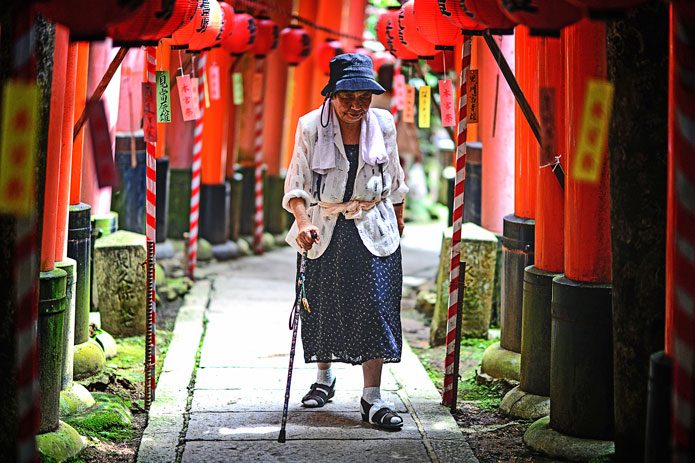
Will economic pundits’ sunny expectations—that Japan’s postwar baby boomers will develop into a free-spending consumer segment who travel, engage in leisure pursuits and enjoy their golden years—turn out to be a big let down?
The Ministry of Internal Affairs and Communications has estimated that in 2015 there were some 18.3mn Japanese people aged between 60 and 69, marking an increase of around 15% over a decade earlier.
This cohort largely comprises the baby boomer generation, born between 1947 and 1949. Despite earlier optimism that these individuals, who began retiring in 2007, would become an active, hedonistic group enjoying a free-spending lifestyle, the picture that’s emerging is not nearly so optimistic.
A 2016 survey of household spending found that monthly outlays for households of two or more people that were headed by a person in their sixties came to about ¥270,000—an increase of about ¥4,200 from 10 years earlier. The increase, however, was attributed to higher spending on food and mobile phone usage, whereas those for recreation and leisure declined.
In the case of travel, for example, data tabulated by the Japan Tourism Agency estimated that during 2015, the domestic travel industry expanded to reach ¥23tn—a 10% rise from 10 years earlier. Yet most of the increase was attributed to inbound visitors, with spending by the 60-plus segment dropping around 20%.
Indeed, the notion of affluent seniors may be proving to be inaccurate. Based on a survey of household expenditures conducted by a research unit operating under the auspices of the Bank of Japan, the average assets of households headed by people in their sixties came to about ¥6.5mn in 2016—a 35% decline since 2007.
One factor responsible for the decline in assets is the drop in payouts of lump-sum retirement payments by employers. The amounts paid, averaging ¥19.66mn in 2014, was down from ¥22.08mn in 2007. In the past, workers accumulated savings in their fifties after their children had reached adulthood and joined the workforce. As a result, once they had retired they were able to spend some of their savings on leisure activities. But the wages now paid to workers in their fifties have declined so much that the overwhelming majority of survey participants (85%) stated they can focus solely on saving enough to support their retirement. Only 16% said they were planning to use some money for leisure.
More workers subjected to compulsory retirement are also deciding to return to the workforce, limiting the time available for travel. Indeed, a 2015 survey found that nearly 30% of men in their sixties had not travelled even once domestically during the previous year. The emerging pattern for men in their sixties may not be a cosy retirement, but merely a four-day work week.